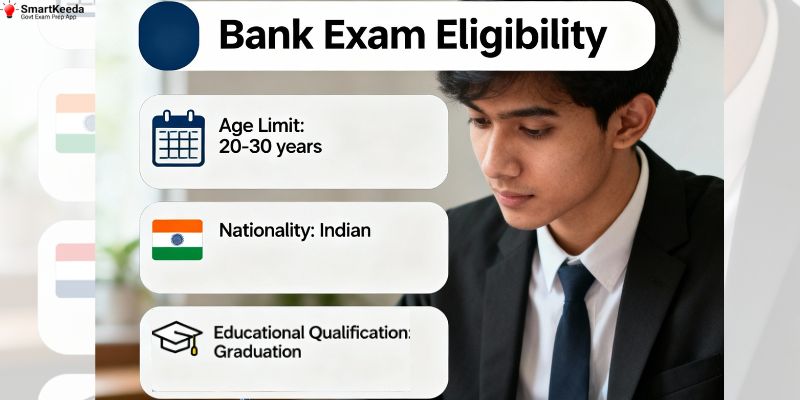Common Myths About Bank Exams Eligibility

Preparing for banking exams can be overwhelming, and one of the first things aspirants check is whether they meet the Bank exams eligibility criteria. However, over time, many misconceptions about eligibility rules have spread among students. These myths often cause unnecessary confusion and may even discourage eligible candidates from applying. In this blog, we will break down the most common myths about bank exams eligibility and set the record straight with facts.
Myth 1: Only Commerce or Finance Graduates Are Eligible
One widespread misconception is that candidates must have a degree in commerce, accounting, or finance to appear for bank exams. The truth is far simpler. Most banking exams like IBPS PO, SBI PO, IBPS Clerk, and RRB exams require a candidate to have a graduation degree in any discipline from a recognized university. Whether you are from engineering, arts, science, or commerce, your graduation degree makes you eligible. What matters more is your ability to crack the exam, not your academic stream.
Myth 2: Strict Age Conditions Restrict Many Aspirants
Many candidates believe that bank exams are only for young graduates in their early twenties. The reality is different. While there are indeed rules for age, the age limit for bank exams is broad enough to include aspirants from various stages of their careers. For example, in most PO exams, the minimum age is 20 years, while the maximum goes up to 30 years. Additionally, reserved category candidates enjoy relaxation in the upper age limit, often extending it by 3–10 years, depending on the category. This ensures that opportunities remain open for candidates who may have pursued higher education, worked a few years in a job, or started their preparation later.
Myth 3: Fluency in English Alone Is Sufficient
Some aspirants think that being fluent in English is enough to clear bank exams. While English is an essential part of the syllabus, it’s only one section that candidates need to prepare for. The exam also tests reasoning ability, quantitative aptitude, general awareness, and computer knowledge. Eligibility criteria require educational qualifications, but cracking the exam itself needs well-rounded preparation. Without competency in all subjects, fluency in English alone won’t guarantee success.
Myth 4: Candidates Must Have Prior Work Experience in Banking
Another myth is that candidates with experience in the banking sector or finance industry are given preference in terms of eligibility. In reality, no prior work experience is required to apply for most banking jobs like IBPS and SBI PO or Clerk. Fresh graduates straight out of college can apply for these exams as long as they meet the educational and age criteria. Work experience may help in interview rounds by boosting confidence, but it is not a formal eligibility requirement.
Myth 5: Eligibility Rules Are the Same for All Bank Exams
A very common misunderstanding is assuming that the Bank exams eligibility rules are uniform for every exam conducted across various banks and authorities. This is not true. While certain criteria such as basic graduation in any stream are common, other rules such as minimum age, maximum attempt limits, and nationality requirements can differ slightly from one exam to another. For example, RBI Grade B requires a minimum of 60% marks in graduation, whereas IBPS and SBI PO exams often just require a pass degree. Candidates must always carefully check the notifications of each exam to avoid confusion.
Myth 6: Attempting Once Makes You Ineligible to Apply Again
Some students worry that failing in their first attempt means they can never reapply. This is absolutely false. The number of attempts is generally unlimited, provided the candidate falls within the specified age limit. You can take the exam as many times as you wish until you cross the maximum age boundary. This myth has caused unnecessary stress for students, but the simple fact remains—you only stop being eligible once you exceed the permitted age criteria mentioned in that particular notification.
Myth 7: Only Indian Citizens Can Apply
Candidates often believe that only Indian citizens are eligible to appear for bank exams. While Indian nationals form the largest group of applicants, the eligibility criteria specify that subjects of Nepal, Bhutan, Tibetan refugees, and individuals of Indian origin who migrated from certain countries with the intention of settling in India are also eligible. This broadens the scope of aspirants who can participate in these exams.
Conclusion
Bank exams are prestigious opportunities that open doors to secure and rewarding careers in the banking sector. Unfortunately, myths around Bank exams eligibility, age restrictions, academic qualifications, and nationality often confuse aspirants. By clarifying these misconceptions, candidates can focus on what truly matters—preparation and consistent practice. Before applying, always read the official notification for the exam you are targeting, since slight differences may apply across different recruitment processes. Clearing these myths not only helps reduce anxiety but also ensures that no deserving candidate is held back by misinformation.



